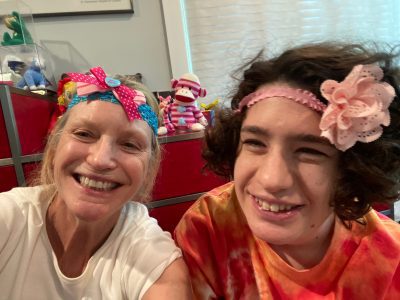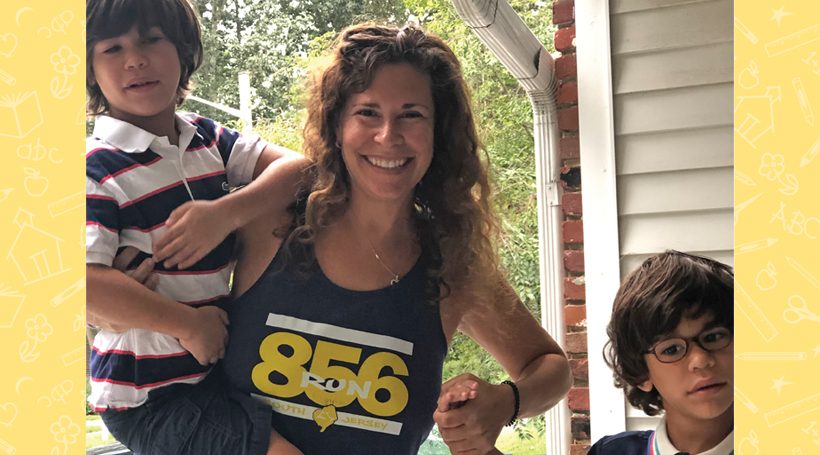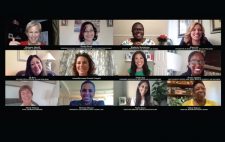Jaime Friedman is not a therapist. She’s not a teacher, an instructional aide or a behavioral analyst. But Friedman is a mom – to 4 kids with special needs. For more than 6 months, since programs and services shut down due to the pandemic, she’s been forced into all those roles and more.
Friedman, 44, lives in Voorhees with her husband Michael and Mallory, 14, Zachary, 10, and 6-year-old twins Nicholas and Brendan. The family is the subject of an ongoing case study at the Children’s Hospital of Philadelphia because all 4 kids have autism, epilepsy or both.
“Before the pandemic, they had the structure of a school setting,” she says. “They were able to receive instruction from their highly trained, amazing teachers, aides and therapists. They also got speech therapy, occupational therapy and physical therapy. The twins, who are both non-verbal, were just getting trained on a communication device. For my kids, structure is everything, and that all came to a stop.”
So too did any time away from the kids for self-care. “I’m not really doing anything for me, or anything by myself right now. I used to be able to fit in a Peloton ride here and there, but I’m not getting that now.”
When the state shutdown brought life outside people’s homes to a grinding halt this spring, many parents struggled to adapt. Though schools and other programs have since transitioned, with varying amounts of success, to a virtual or socially distanced learning environment, it’s been even harder on families of kids with special needs to make the switch. Like the Friedman siblings, many depend heavily on those resources. Without those supports, even more falls onto their parents. And that’s why Friedman is in overdrive just trying to keep her kids from falling behind.
“With my twins, I’m lucky if I can get them to sit in front of the computer for 10 minutes,” says Friedman, who works part time for a local law group. “It really does not work for my children. Skills that have taken us years to attain are just lost. I’m losing these kids. This is such a crucial time in their development and I’m losing them. Behaviorally they’ve regressed so much.”
Although Friedman has continued to work remotely, she is only able to do so when her husband is available or her babysitter is able to come to the house. “I need another adult, otherwise I won’t be able to get anything done,” she says. “Working has been incredibly difficult.”
Through the summer and into September, Friedman was able to keep the kids occupied for large portions of the day with outdoor activities. “Thankfully, we have a pool, a swing-set and a fenced-in yard,” she says. “We’ve been outside every day, playing, going in the pool. My fear is what happens when winter comes.”
Swimming pool season was also a godsend for Cherry Hill resident Paula Solomon, who spent the better part of the summer with her daughter Sydney in a condo building with a pool at the Jersey shore. Sydney, 28, is deaf and was diagnosed early on with cerebral palsy. She also has severe developmental and neurological delays and a seizure disorder.

Paula and Sydney Solomon
Sydney’s favorite thing to do is swim. And until the summer ended she was able to do that for hours every day, like she did in her pre-pandemic life at either the Katz JCC or a neighbor’s pool. In their condo near the beach, Solomon says everyone knows Sydney, and that made it easier to take care of her daughter and herself.
“It was nice because it’s more social,” she says. “At home I feel so isolated.”
Before the pandemic, Sydney worked with both an occupational and physical therapist, and Solomon had 3 in-home aides who rotated throughout the week. When the virus began to spread, both therapists were also working in nursing homes, and 2 of the aides were continuing to either work in an office or go to church services and restaurants.
“I contacted them and said sorry, we cannot continue at this time,” Solomon says. “I just didn’t feel comfortable having them in my home.”
Sydney also stopped attending her adult day program on weekdays. Her near-daily activities, ranging from yoga class to horseback riding lessons, were cancelled or moved online. And the family’s plans – for Sydney to move into full-time housing – were delayed for months.
“I’ve been taking care of Sydney for 28 years, and I won’t lie,” she says. “It’s restricted our lives very, very much. We’ve never been able to travel, because I’ve never been able to find someone to stay with Sydney for a long period of time.”
Now, instead of moving her daughter into an independent-living situation under the watchful eyes of a team of professional, live-in aides, “I’m basically doing everything,” Solomon says. “Sydney requires full care. I have to bathe her. I have to help her get dressed. I prepare all her meals and assist her with eating. My job has become full-time caretaker and teacher.”
Of course, Solomon says, they’re making the best of it and having a lot of fun. And as a former teacher, she’s used to playing the role of educator. “We do a lot of art projects and cooking activities,” she says. “We go to the park, and ride bikes on the boardwalk. When we go out, we wear matching cat masks and she thinks that’s so much fun. This has brought back my creativity as a teacher.”
But it’s taken things from Solomon too. “I’m a very, very active person,” she says. “Now when my husband comes home from work, I go for a walk. But I was always going to the gym, playing tennis, running errands while Sydney was in her day program, and I don’t do any of that now.”
Gabrielle Lasko, a mom of 7-year-old twins in Lindenwold, is going to great lengths to make sure her daughters, Mikayla and Sophie, can spend as much time in the classroom as possible. Both girls are on the autism spectrum, and when their public school announced classes would be fully remote, Lasko enrolled them in a private Catholic school.
“Online learning did not work for them,” Lasko says. “We’d sit down at the computer and there would be meltdowns. They would scream at me. Mommy should not be the teacher.”
It was emotionally demanding for Lasko. “We spent the entire summer stuck in the house, not going anywhere. I was not going to do that for the whole school year, too.”
Lasko says all of her Covid-related concerns about sending the girls to in-person classes have been outweighed by their need for resources. “It’s costing me a fortune, but I’m doing it,” she says.
Friedman counts herself lucky to have kids who are content and safe with her at home, but she worries about what will happen if she’s forced to continue trying to meet all their needs as the months move on. Her kids started school on a hybrid, part-time in-person schedule in September, but Friedman’s optimism is cautious, and she’s concerned that a resurgence of the pandemic could land them back at home full-time.
“They really are happy, and so I guess at the end of the day that’s the most important thing,” she says, “but they need that structure back. The reality is, for my kids, the remote learning doesn’t work. Their teachers are amazing, and they need to be in school working one-on-one. I have so much respect for their teachers – to me they’re like family. We’re a team. And I need my team to help my kids succeed and move forward.”
A guide to parenting through the pandemic
It’s a challenging time; there’s no way around it. But these tips from psychologist Jeffrey Selman, vice president of clinical services at First Children Services, can help parents handle the curveballs of Covid-19.
Remain calm
“This has been tough for families, but as they get overwhelmed and anxious, it makes it harder to problem solve on the fly and remain calm,” Selman says, noting it’s all too easy to get down on yourself over what may seem like parental failings. “Give yourself some credit, some positive reinforcement and the opportunity to feel good about the things that have gone well.”
Relax and recharge
“Self-care is so important, even if it’s just taking a 5-minute break – you don’t have to go to the gym or plan a weekend away,” Selman says. “Go for a walk around the block or take 5 minutes to yourself. Look at it as prevention. Be aware of your frustration and give yourself permission to walk away.”
Routine is your friend
School is all about routine and having structure with flexibility, and it’s especially important for kids with special needs. Recreate school routines at home as much as possible, Selman suggests. A bonus is that many of the tools that help kids in a school setting can translate to at-home learning.
“Visual supports and checklists are things you can transfer over in creative ways in the home,” he says.
And when it comes to getting used to a radical new way of learning, practice makes perfect. “Practice when they’re not supposed to be doing school. Practice what it looks like to be sitting in a virtual class. Rehearse clicking the right button, having our material next to us. Figure out: what does it look like to ask for help? What is it like to have my screen video on? What’s causing discomfort and how can I overcome it?”
Request help
Remember, Selman says, you’re not in this alone. “Parents should feel like they can ask for help, and schools should be ready to provide it. Schools and teachers are part of the team, and everyone needs to be compassionate and empathetic on both sides.”
Remember to laugh
It’s easy to get wrapped up in the stressful moments, but a little laughter can go a long way. “A few minutes of informal play time with a child can help the whole climate of the home,” Selman says. “It’s hard enough to be a parent and wear these different hats – don’t forget that there’s some fun stuff in there too.”














